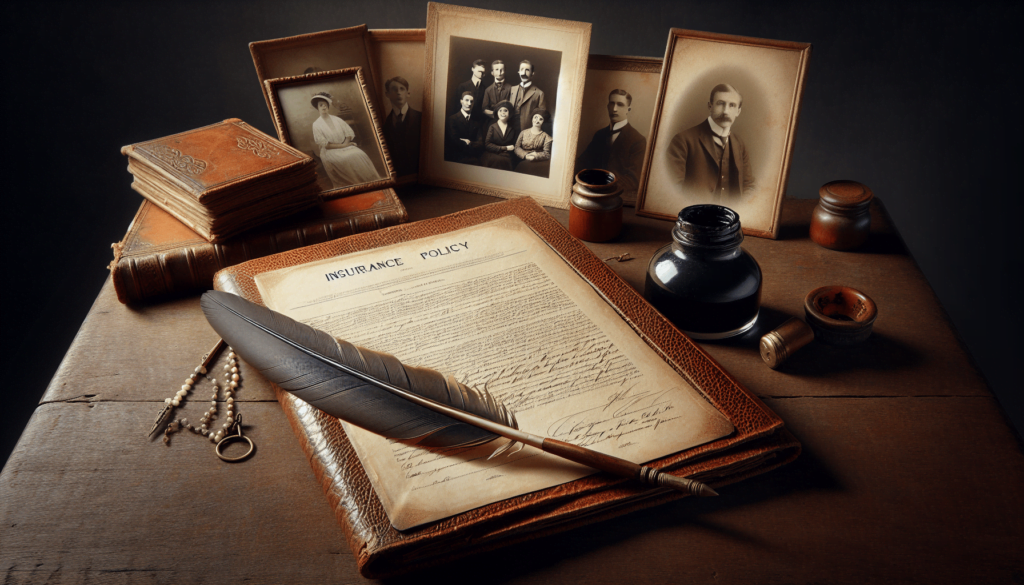What do you know about the evolution of professional liability insurance? This type of coverage has been around for quite some time and has undergone significant changes. Understanding these shifts helps you better appreciate the security it offers to professionals across various industries.
The Evolution of Professional Liability Insurance
In its early days, professional liability insurance was quite simple—aimed mainly at the medical and legal professions. However, as the professional landscape grew and diversified, so did the policies available. Coverage began to expand to other professions, including architects, engineers, consultants, and even newer fields like technology and healthcare.
The Importance of Professional Liability Coverage
As businesses grow, the stakes get higher. Professionals can face lawsuits that pose substantial financial risks. This is where professional liability insurance steps in. It not only defends you against claims but also covers the costs of litigation and settlements if necessary. By investing in this insurance, you protect your livelihood and ensure that your business can continue to operate despite potential setbacks.
The Role of Professional Liability in Business Continuity
Imagine a scenario where a client claims that your service caused them financial harm. Without professional liability insurance, your business may struggle to cover legal costs or damages awarded by the court. Here, professional liability insurance acts as a safeguard, allowing you to focus on business continuity rather than financial ruin.
Protecting Your Business Assets
How to Evaluate Your Need for Professional Liability Coverage
Understanding the need for professional liability coverage can depend on several factors, including your industry, the size of your business, and your current risk exposure. Here’s how you can gauge whether you require this type of coverage.
Identifying Risk Factors
Assessing Your Existing Coverage
Tailoring Liability Insurance for the Tech Industry
The tech industry is rapidly evolving, and so are the risks involved. Professionals in this field often face unique challenges such as data breaches, system failures, and client disputes over deliverables.
Specialized Coverage Options
Tech companies may require tailored professional liability insurance plans that address specific risks, including cybersecurity threats and intellectual property disputes. Engaging with an insurance specialist who understands the tech landscape can help you secure an adequate policy that fits your needs.
Professional Liability Needs for Healthcare Providers
In healthcare, the stakes are particularly high. Professionals face the potential for malpractice claims that can arise from various services, from surgical errors to improper client care.
Importance of Malpractice Insurance
Having malpractice insurance can protect healthcare providers from claims of negligence while simultaneously ensuring that they can continue their practices without financial distress. This coverage can be especially vital for newly established practices where resources may be limited.
Insurance Challenges in the Construction Sector
The construction industry often finds itself in a complex liability environment. With multiple stakeholders involved, risks can easily escalate, leading to disputes and claims.
Navigating Complicated Risks
From contractor errors to site safety issues, construction professionals face a myriad of risks. Choosing the proper professional liability insurance that accommodates these specific challenges is crucial for effective risk management.
Legal Professionals: Unique Insurance Considerations
Legal professionals must also be aware of their unique responsibilities and the corresponding risks they face. Errors in judgment, missed deadlines, or miscommunications can lead to significant consequences.
Protecting Against Malpractice Claims
Financial professionals are expected to offer sound advice that can substantially impact their clients’ financial well-being. A mistake in judgment can lead not only to loss of reputation but also to legal repercussions.
Securing Financial Success
The Impact of AI on Professional Liability Policies
As artificial intelligence continues to integrate into various sectors, the implications for professional liability insurance are profound. Decisions made by algorithms can result in errors that may create liability scenarios.
Addressing New Risks
As a business owner leveraging AI, you must consider how these technologies impact your liability. Professional liability insurance should include clauses that account for operational challenges stemming from AI usage.
Cybersecurity Threats and Their Influence on Insurance Needs
In today’s digital landscape, cybersecurity threats are a reality. Businesses must brace themselves for the potential fallout from data breaches or cyberattacks.
The Growing Need for Cyber Liability Coverage
Many insurers are now combining professional liability and cyber liability insurance to adequately protect business owners. This integrated approach is essential as the digital and physical worlds merge.
How Climate Change Affects Liability Risk Assessments
The rising threats posed by climate change—such as extreme weather events—can influence liability risk assessments across diverse industries. As a professional, you must be aware of how these evolving risks can impact your insurance needs.
Adapting Coverage to Evolving Risks
Insurance providers are increasingly assessing risks related to climate change, incorporating these factors into their liability coverage. This shift underscores the importance of regularly reviewing your insurance policy to ensure it reflects current threats.
Social Engineering: A Growing Concern for Insurers
As businesses increasingly rely on technology, social engineering attacks have become more common. These tactics exploit human psychology, often leading to data breaches and financial loss.
Enhancing Security Awareness
Training employees on recognizing social engineering attacks can significantly mitigate liability risks. As a business owner, bolstering your security culture and investing in related insurance coverage is crucial.
Navigating the Hard Market in Professional Liability
A hard insurance market can make securing adequate professional liability coverage challenging. During such times, prices rise, and coverage options may become limited.
Evaluating Your Options
While a hard market can be tough, it is essential to focus on finding the best options available. Engaging with insurance brokers who can lend their expertise and negotiate better terms may prove beneficial during these market shifts.
Lessons from High-Profile Professional Liability Lawsuits
High-profile lawsuits often serve as cautionary tales for professionals across various fields. They provide insights into potential liabilities that can arise and the importance of having the appropriate insurance coverage.
Learning from Real-World Examples
By studying these instances, you can better understand risks and their implications. Utilize these lessons to shape your liability management strategies, helping you avoid similar pitfalls in your profession.
How Large Corporations Manage Their Liability Risks
Large corporations typically employ comprehensive risk management strategies to safeguard against potential liabilities. Understanding their approach can provide valuable lessons for smaller businesses.
Best Practices for Risk Management
These organizations often conduct thorough risk assessments, invest in training, and negotiate favorable insurance terms. Emulating some of these best practices can help you better navigate your own business environment.

Case Study: Successful Claims Mitigation Strategies
To learn how to effectively manage liability claims, consider examining successful mitigation strategy case studies. These examples provide practical insights into how to minimize risks.
Documenting and Reporting
Effective documentation and timely reporting when potential issues arise can play a pivotal role in mitigating claims. Understanding how to structure documentation can benefit your business in the long run.
The Financial Impact of Negligence Claims on Small Businesses
Small businesses are particularly vulnerable to the financial fallout from negligence claims. A single lawsuit can jeopardize your operations, making appropriate coverage critical for survival.
Protecting Your Bottom Line
Understanding how negligence claims can impact financial stability highlights the importance of adequate insurance coverage. Investing in professional liability insurance can shield your business against potential closures due to legal challenges.
Reviewing actual errors and omissions claims can help you anticipate and navigate similar issues. Real-world case studies shed light on how companies resolved these claims successfully.
Learning from Success and Failure
A Step-by-Step Guide to Filing a Professional Liability Claim
If you find yourself needing to file a claim, having a clear process in place can help ensure that nothing falls through the cracks. Here’s a simplified step-by-step guide:
1. Notify Your Insurer
Immediately inform your insurer of any potential claims. Providing early notice can help establish the timeline and details necessary for an efficient claim process.
2. Document Everything
Gather all pertinent information related to the claim, including emails, contracts, reports, and any correspondence. Thorough documentation is your best defense.
3. Work with Underwriters
Your underwriters will assist you through the claims process. Provide them with all necessary information and updates to facilitate smooth communication.
4. Seek Legal Counsel
In many cases, you may benefit from legal counsel who specializes in professional liability. Their expertise can provide an additional layer of protection throughout the claim process.
Consider Your Professional Risks
Assess the specific risks associated with your profession. This step helps you determine how much coverage you’ll need and what types of exclusions to watch out for in your policy.
Compare Multiple Quotes
Don’t settle for the first policy you find. Take the time to compare quotes from multiple providers to ensure you’re getting fair coverage at a reasonable price.
Understand the Policy’s Terms
Carefully read through policy terms, especially concerning coverage limits and exclusions. Being informed upfront prevents surprises during the claim process.
Insurance policy limits and deductibles play a crucial role in protecting your financial interests. Here’s what to consider.
Deciding on Limits
Determine how much coverage your profession lends itself to, and ensure those limits align with your business’s potential liabilities.
Balancing Deductibles and Premiums
Finding an appropriate balance between your deductible and premiums is essential. While lower premiums might seem tempting, they can often come with higher deductibles that arrive at the worst moment.
Tips for Negotiating Better Terms with Your Insurer
Having effective negotiation strategies can help you secure favorable terms in your professional liability insurance.
Build Relationships
Establishing a rapport with your insurer can provide leverage during negotiations. A strong relationship may lead to more customization options in your coverage.
Know Your Needs
Go into discussions with a detailed understanding of your requirements. Being well-prepared allows for clearer communication and aids in achieving the desired terms.
How to Educate Employees About Liability Risks
Your employees are not only your greatest assets but also potential liability risks if not properly trained. Fostering an understanding of liability can significantly help mitigate risk.
Training Programs
Implement regular training sessions that address potential liability risks relevant to your industry. This ensures your team knows how to handle its responsibilities effectively.
Encouraging Open Dialogue
Create an environment where your employees feel comfortable discussing their concerns or questions regarding liability. Open communication promotes a culture of risk awareness.
Exploring Niche Markets for Professional Liability Coverage
Some professions may find it beneficial to seek specialized coverage due to unique circumstances within their industries.
Understanding Niche Needs
Niche markets often have specific risks, requiring tailored solutions. Investigate any unique liability scenarios that may apply to your profession, and seek coverage that meets those particular needs.
Customizing Policies for Emerging Industries
As new industries arise, so do the risks associated with them. Customizing your professional liability policy is essential to adapting to these changes.
Working with Experts
Consulting experts in emerging industries can provide valuable insights into unique risks. Their guidance can help you tailor coverage that meets evolving standards.
The Role of Professional Associations in Shaping Coverage Needs
Professional associations often play a crucial role in advocating for tailored insurance products that cater to specific industry needs.
Utilizing Resources for Your Advantage
Take advantage of resources and educational materials provided by these associations. They often have insights and offerings that can help streamline your insurance acquisition process.
Leveraging Industry-Specific Insights to Enhance Coverage Options
Understanding industry-specific insights can greatly enhance the quality of your professional liability coverage.
Staying Informed
Participating in industry events or training workshops can keep you up-to-date on best practices and emerging trends. Knowledge is key as it empowers you to make informed decisions.
Integrating your professional liability insurance into a broader risk management strategy is beneficial.
Include All Aspects of Risk
Ensure your risk management plan accounts for all potential liabilities, including those not covered by insurance. This comprehensive approach strengthens your overall protection.
Professional Liability Insurance 101: A Beginner’s Guide
If you’re new to professional liability insurance, here are the basics to get you started:
What It Covers
Professional liability insurance covers claims of negligence, errors, and omissions related to services you provide.
Who Needs It
Errors and omissions insurance protects professionals against lawsuits stemming from mistakes or failures in their services. Here are the key points:
Coverage Features
Understanding Exclusions
Every insurance policy comes with exclusions, so be sure to identify what’s not covered. This knowledge can help you prepare for potential loopholes or vulnerabilities.
Why Every Professional Needs Liability Coverage
If you provide any type of professional service, you need liability insurance. The reasons are straightforward:
Risk Mitigation
Professional liability insurance helps safeguard your savings and future earnings should a claim arise. This coverage protects your business, reputation, and income.
Increased Credibility

Understanding the Claims Process: What to Expect
Filing a claim can initially feel daunting, but understanding the process can significantly reduce anxiety.
Step-by-Step Overview
- Notify Your Insurer: As soon as you anticipate a claim, reach out to your insurer to alert them and gather needed documentation.
- Investigation Stage: Insurers will investigate the claim, reviewing the documentation provided.
- Resolution: Depending on the findings, settlement negotiations or legal proceedings may follow.
Key Terms and Definitions in Professional Liability Insurance
Familiarizing yourself with common terms can help you navigate the world of professional liability insurance more effectively.
| Term | Definition |
|---|---|
| Deductible | The amount you pay out of pocket before insurance kicks in. |
| Coverage Limit | The maximum amount your insurer will pay for a claim under your policy. |
| Exclusion | Specific situations or items that are not covered by the policy. |
Knowing the Terms
Understanding these terms can help prevent confusion when discussing your policy and make filing claims less overwhelming.
It’s important to be aware of exclusions that may apply to your professional liability insurance. Knowing what your policy does not cover will allow you to assess your risks better and fill potential coverage gaps with supplementary policies.
Typical Exclusions
- Intentional wrongdoing or criminal acts
- Claims related to bodily injury or property damage
- Claims arising from services outside your professional scope
The Role of Risk Management in Mitigating Liability
Risk management is integral to protecting your business. By proactively identifying and managing potential risks, you can significantly reduce liability exposure.
Implementing a Risk Management Plan
Creating a risk management plan involves assessing risks, implementing preventive measures, and consistently monitoring outcomes. This continuous evaluation helps keep your business safeguarded against unforeseen claims.
Factors Affecting Professional Liability Premiums
Key Influencing Factors
- Industry risk level
- Business size and revenue
- Claims history
Comparing Claims-Made vs. Occurrence Policies
When choosing a policy, you’ll typically encounter two types of coverage: claims-made and occurrence policies. Grasping the differences can help tailor your selection to your needs.
Claims-Made Policies
These policies protect against claims made during the policy period; however, coverage ceases once the policy is canceled unless a tail is purchased.
Occurrence Policies
Occurrence policies provide coverage for incidents that occur during the policy period, regardless of when the claim is filed. This approach offers more extended coverage but tends to be more expensive.
The Importance of Adequate Coverage Limits
Having appropriate coverage limits is essential for protecting your business from costly claims. Underestimating your coverage can lead to significant financial hardship in the event of a lawsuit.
Evaluating Your Needs
To determine coverage limits, consider the breadth of your services and the potential for claims.
How to Choose the Right Deductible for Your Business
Selecting a deductible is an important decision that may affect your premiums and financial exposure.
Weighing Options
A higher deductible can lead to lower premiums. However, ensure that you can absorb the deductible amount in case of a claim. Finding an appropriate balance is essential.
The Impact of Prior Claims on Future Insurability
Your claims history can influence your future insurability. Insurers often evaluate past claims when determining coverage options and premiums.
Managing Your Claims History
Being proactive in claims management and mitigating risks can help improve your insurability status over time.
When to Review and Update Your Liability Coverage
Regularly reviewing your policy is crucial. A change in your business structure, services offered, or even shifts in the market can necessitate updates to your coverage.
Establishing a Review Schedule
Consider setting an annual reminder to reevaluate your needs. Keeping your liability insurance aligned with your current operations is key to maintaining adequate protection.
The Role of Brokers and Agents in the Insurance Process
Insurance brokers and agents serve as valuable allies in navigating the complex world of liability insurance. Their expertise can prove beneficial in securing suitable coverage.
Finding the Right Fit
When selecting a broker or agent, seek individuals with experience in your industry. Their tailored knowledge helps facilitate smart coverage decisions.
Tips for Communicating with Your Insurer
Maintaining open and effective communication with your insurer can enhance your insurance experience. A strong relationship can lead to better terms and support when you need it most.
Be Transparent
Honesty and transparency are critical when dealing with your insurer. Share any significant changes within your business that may affect your policy.
Professional Liability for Accountants: Beyond the Numbers
Accountants face unique challenges and risks, making professional liability insurance essential for protecting against claims arising from their work.
Focus on Financial Accuracy
Architects and Engineers: Building a Strong Insurance Foundation
For architects and engineers, the risks associated with design and construction are substantial. Professional liability insurance plays a crucial role in mitigating these risks.
Protecting Project Investments
Attorneys at Law: Protecting Your Practice from Malpractice Claims
For legal practitioners, malpractice claims are a serious risk. Professional liability insurance provides necessary protection against potential lawsuits.
Safeguarding Your Reputation
Consultants offer unique services and face a range of risks. Professional liability insurance is necessary to safeguard against claims stemming from advice or services provided.
Highlighting Service Failures

Dentists: Navigating the Complexities of Liability Insurance
In the healthcare field, dentists face high exposure to liability claims. Malpractice insurance is crucial for any practice seeking to mitigate these risks effectively.
Understanding Coverage Needs
The specific coverage needs for dentists may vary based on services offered, patient volume, and location. Evaluating these factors will guide your insurance decisions.
Financial Advisors: Shielding Your Clients’ Investments
Managing the Risks of Investment Advice
Advisors must navigate the complexities of investment strategies, which can expose them to liability claims if clients experience financial losses.
Healthcare Professionals: The Importance of Malpractice Insurance
Healthcare providers operate in a high-risk environment, making malpractice insurance a necessity to protect against claims due to negligence or subpar care.
Offering Assurance to Patients
Having adequate malpractice coverage instills confidence in patients and shows that you are committed to quality and safety.
IT Professionals: Mitigating Cyber Risks and Data Breaches
As technology becomes increasingly integrated into daily operations, IT professionals must be prepared for the potential legal implications of cyber risks.
Addressing Emerging Threats
Cyber liability coverage becomes essential in protecting IT professionals from lawsuits following data breaches and other cyber incidents.
Insurance agents face their own unique set of challenges. Errors in policy placement can lead to significant liability claims.
Setting Appropriate Standards
Real Estate Agents: Avoiding Liability in Property Transactions
The real estate industry carries unique risks, with agents facing the potential for negligence claims during property transactions.
Building Strong Client Rapport
Tech Startups: Tailoring Coverage for Emerging Risks
Emerging tech startups often face evolving risks that require specialized insurance policies to mitigate liability.
Understanding Unique Challenges
Tailoring your liability insurance to accommodate risks unique to new technologies will ensure your startup remains protected as it grows.
Nonprofits: Addressing Unique Liability Concerns
Nonprofit organizations have their own set of challenges and risks. Professional liability insurance becomes essential for safeguarding against claims arising from services rendered in pursuit of their mission.
Effective Risk Management Measures
Implementing a comprehensive risk management plan can greatly enhance your nonprofit’s protection and bolster your mission’s integrity.
Media and Entertainment: Managing Risks in a Creative Field
The media and entertainment industry often encounters unique liability risks ranging from copyright infringement to defamation claims.
Tailoring Coverage to Creative Challenges
Artistic professionals should work with insurers who understand the intricacies of creative work to secure coverage that aligns with their specific needs.
Hospitality Industry: Protecting Your Guests and Reputation
The hospitality sector faces unique liabilities capable of impacting a business’s reputation and financial standing.
Ensuring Adequate Guest Protection
Educational Institutions: Liability Concerns in Academia
Educational institutions navigate various liabilities, making professional liability insurance crucial for safeguarding students and staff against negligence claims.
Committing to Safety
The Rise of Cyber Liability: Protecting Against Digital Threats
As more businesses transition to a digital-first approach, cyber liability insurance becomes increasingly valuable in protecting against emerging digital threats.
Mitigating Cyber Risks
This distinct coverage complements traditional professional liability insurance, ensuring robust protection against the potential fallout of digital risks.
The Impact of AI on Professional Liability: New Risks and Opportunities
As AI continues to evolve, so do the risks associated with its use across various industries, necessitating insurance adaptations.
Staying Ahead of Emerging Technologies
Professionals must constantly assess their insurance needs in light of AI developments to avoid gaps in coverage.
Climate Change and Liability: Assessing Evolving Risks
The increasing impact of climate change means that businesses must adapt their liability assessments and insurance coverage accordingly.
Preparing for Environmental Challenges
Regularly reviewing your professional liability policies can help ensure that your coverage accounts for any emerging risks related to climate change.
Social Engineering: The Human Factor in Liability Claims
Social engineering attacks exploit human behavior. Understanding these risks can drastically influence your approach to professional liability insurance.
Implementing Awareness Strategies
Creating robust training and awareness programs can instill a stronger security culture within your organization, minimizing potential claims.
Navigating the Hard Market: Strategies for Securing Coverage
If you find yourself in a hard insurance market, consider implementing strategies to navigate the landscape successfully.
Maintaining Flexibility
Being adaptable and willing to explore different coverage options can help you secure necessary protection amid challenging market conditions.

The Gig Economy: Liability Considerations for Freelancers and Contractors
As the gig economy grows, so does the need for freelancers to consider their liability exposure.
Investing in Personalized Coverage
Freelancers must look for professional liability insurance tailored to their specific services and corresponding risks to safeguard their livelihood.
Telemedicine: Addressing Liability Concerns in Remote Healthcare
The rise of telemedicine introduces unique liability concerns that healthcare providers must navigate.
Understanding New Risks
Securing appropriate malpractice insurance that specifically addresses telemedicine-related liabilities will be essential for practitioners delivering care remotely.
Remote Work: The Impact on Professional Liability Risks
The shift to remote work has introduced new dimensions of liability, necessitating evaluations of existing insurance coverage.
Adapting Policies to New Norms
Assessing your professional liability insurance policy to account for the risks associated with remote work is paramount to maintaining adequate coverage.
Evolving Regulatory Landscape: Staying Compliant with Insurance Requirements
Keeping up with regulatory changes affecting professional liability insurance is crucial for maintaining compliance and protection.
Prioritizing Compliance
Staying informed about legislative changes enables businesses to adapt their policies and practices accordingly, ensuring legal obligations are met.
The Role of Data Privacy in Liability Insurance
Data privacy concerns are more prominent than ever, demanding attention in insurance underwriting and liability considerations.
Protecting Client Data
As data breaches can lead to significant liability claims, understanding how your policy addresses data privacy is crucial for maintaining compliance with regulations.
Mental Health Professionals: Addressing Unique Liability Concerns
Mental health professionals must navigate a complex landscape of liability risks tied to client interactions and treatment outcomes.
Ensuring Robust Coverage
Adequate professional liability insurance ensures that mental health providers can focus on delivering care without undue anxiety about potential claims.
The Impact of Social Media on Reputation and Liability
Social media is a double-edged sword, providing marketing opportunities and potential risks that can lead to liability claims.
Managing Your Online Presence
Being proactive in managing your social media presence and understanding its implications can help mitigate potential risks associated with online interactions.
Professional Liability in the Age of Globalization
With the world becoming increasingly interconnected, globalization has introduced new liability challenges for professionals.
Understanding Global Risks
As you expand your practice internationally, understanding how liability laws may vary between countries becomes essential to ensuring adequate coverage.
Drones and Autonomous Vehicles: New Liability Frontiers
The rise of drones and autonomous vehicles requires a reexamination of liability insurance, presenting unique risks and opportunities.
Adapting Coverage to Technological Change
As new technologies emerge, keeping your insurance policy updated to reflect these changes is crucial for maintaining adequate protection.
The Future of Professional Liability Insurance: Predictions and Trends
The landscape of professional liability insurance continues to evolve, influenced by social, economic, and technological factors.
Planning for Change
Staying informed about trends can help you anticipate potential challenges and adjust your insurance strategies accordingly.
Creating a Culture of Risk Awareness: Employee Training and Education
Fostering a culture of risk awareness is essential for reducing your business’s exposure to liability.
Continuous Education Programs
Investing in ongoing training and systematic education helps employees understand their liability risks and contributes to improved risk mitigation efforts.
Implementing Effective Risk Management Strategies
Your business can benefit significantly from implementing comprehensive risk management strategies.
Continuous Assessment
Regularly assess your risk management processes to ensure your approach evolves in tandem with your industry’s changes.
Developing Comprehensive Incident Response Plans
Preparing for potential incidents through well-structured response plans can help mitigate liability risks.
Reviewing Response Procedures
Having a detailed incident response plan allows for efficient action if claims do arise, reducing the potential financial impact on your business.
The Importance of Documentation in Liability Claims
Documenting your business practices is an essential defense against claims.
Creating Detailed Records
Maintaining organized and detailed records can significantly influence the outcome of any claim, establishing timelines and validating proper procedures were followed.
Best Practices for Client Communication and Engagement
Engaging effectively with clients is critical for avoiding misunderstandings that may lead to claims down the line.
Building Client Relationships
Fostering strong relationships through clear communication can help mitigate potential disputes and concerns, building trust between you and your clients.
Managing Conflicts of Interest to Minimize Risk
Recognizing and addressing conflicts of interest is essential for professionals to minimize liability exposure.
Establishing Conflict Guidelines
Create clear guidelines to handle potential conflicts of interest proactively. Addressing these issues upfront showcases your commitment to ethical practices.

Utilizing Technology to Enhance Risk Management
Embracing technology can elevate your risk management strategies and enhance your liability protection.
Investing in Risk Management Software
Consider investing in software that helps assess risks and manage claims, providing valuable tools for comprehensive risk management.
The Role of Internal Audits in Loss Prevention
Conducting regular internal audits can help identify areas of exposure and reduce liability risks.
Continuous Improvement
Use insights from audits to refine processes and policies, creating a safer and more compliant work environment.
Case Studies: Lessons Learned from Liability Claims
Analyzing real-world case studies offers invaluable lessons that can shape your risk management practices.
Emphasizing Practical Insights
Utilize case studies to brainstorm proactive strategies and reinforce essential risk management principles within your organization.
Expert Insights: Interviews with Risk Management Professionals
Engaging industry professionals for insights into liability issues can heighten your understanding of effective risk management.
Learning from the Best
Incorporating expert perspectives can provide practical guidance that you can apply to your own business.
Avoiding Common Pitfalls: Tips for Reducing Liability Exposure
Being aware of common mistakes can help you avoid pitfalls that could lead to costly claims.
Establishing Clear Policies
Create clear internal policies to guide employee behavior and promote adherence to best practices— these initiatives can significantly mitigate liability exposure.
The Importance of Continuous Improvement in Risk Management
Risk management isn’t a one-time task; it requires ongoing evaluation and improvement.
Adopting a Growth Mindset
Embrace a mindset of continuous learning and adaptation when it comes to your risk management strategies. This approach helps you stay ahead of evolving risks.
Creating a Safe and Secure Work Environment
Fostering a secure work environment is vital for protecting your employees, clients, and overall business.
Prioritizing Safety Protocols
Implementing and maintaining rigorous safety protocols can significantly reduce liability risks and create a positive workplace culture.
Managing Third-Party Risks: Vendors and Contractors
As businesses collaborate with various vendors and contractors, managing third-party risks becomes crucial.
Establishing Written Agreements
Utilize legal agreements to clarify responsibilities and liability, ensuring that all parties understand their obligations.
The Role of Professional Associations in Risk Management
Professional associations often offer valuable resources, insights, and support for effective risk management.
Engaging with Your Association
By participating in association activities, you can access knowledge and tools to bolster your risk management initiatives.
Understanding the Claims Notification Process
Understanding how to effectively navigate the claims notification process is crucial for timely responses.
Timelines and Responsibilities
Establish clear timelines for notifying insurers and ensure your team understands the claims responsibilities involved.
Working with Claims Adjusters: Tips for a Smooth Experience
Collaboration with claims adjusters can make the claims process more efficient.
Building Relationships
Establish open lines of communication and provide necessary information promptly to ensure a smoother claims experience.
The Role of Legal Counsel in Liability Claims
Legal counsel is a critical component of successfully managing liability claims.
Engaging with Experts
Consult legal experts early in the process to navigate complexities and enhance your defense against potential claims.
Preparing for Litigation: Key Considerations
If a lawsuit arises, understanding litigation’s implications is vital for your strategy.
Creating Litigation Plans
Formulate clear plans outlining steps to manage litigation should it arise, ensuring a streamlined response to legal proceedings.
Mediation and Alternative Dispute Resolution: Options for Resolving Claims
Mediation and alternative dispute resolution methods can offer more efficient avenues for resolving claims compared to traditional litigation.
Exploring Options
Consider these alternatives early in the claims process to facilitate timely and effective resolutions.
Expert Witnesses: Their Role in Liability Cases
When navigating complex liability cases, expert witnesses can significantly influence case outcomes.
Seeking Qualified Experts
Identifying and engaging qualified experts can enhance your case and potentially lead to more favorable outcomes.
Managing the Emotional Impact of a Liability Claim
Liability claims can impose emotional strain on individuals. Understanding and addressing this impact is essential.
Providing Support Systems
Creating support systems for your team can help manage emotional challenges, fostering resilience during difficult times.
Case Studies: Analyzing Real-World Claim Scenarios
Examining real-world claim scenarios provides insight into liability risks and mitigation strategies.
Learning from Experience
Draw lessons from successes and failures to enhance your understanding of effective risk management.
The Impact of Litigation on Reputation and Brand Image
Legal proceedings can greatly affect your professional reputation and overall brand image.
Managing Public Perception
Establishing a proactive public relations strategy is crucial for maintaining your business’s reputation amid litigation.
Protecting Your Business During a Claim: Continuity Strategies
Maintaining business continuity during a claim is crucial for ongoing operations and reputation.
Developing Continuity Plans
Building comprehensive business continuity plans ensures you remain operational while addressing potential claims.
The Role of Public Relations in Managing Liability Crises
Effective public relations can serve as a powerful tool in handling liability crises.
Crafting Clear Messaging
Response strategies that prioritize transparency can help mitigate the impact of liability-related reputational damage.
Lessons Learned from High-Profile Liability Lawsuits
High-profile lawsuits offer important lessons that can inform future risk management practices.
Emphasizing Prevention
Drawing lessons from past lawsuits should reinforce the importance of proactive risk management strategies.
Understanding the Financial Costs of Litigation
Recognizing the financial impact of litigation prepares businesses for the potential fallout from claims.
Planning for Litigation Expenses
Budgeting for litigation costs can help buffer your operations and protect against destabilizing financial pressures.
Strategies for Negotiating Favorable Settlements
When it comes to claims, negotiation plays a critical role in achieving favorable settlements.
Building Strong Cases
Establishing a strong case backed by documentation allows for more effective negotiation with opposing parties and insurers.
The Importance of Post-Claim Analysis and Improvement
After a claim has been resolved, conducting a thorough post-claim analysis can provide valuable insights.
Creating a Feedback Loop
Utilize the results of this analysis to enhance your risk management strategies moving forward, minimizing exposure to future claims.
The History of Professional Liability Insurance
In conclusion, professional liability insurance has a rich history that reflects the evolving landscape of professional risks. Gaining insights into its evolution allows you to make informed decisions about the coverage you select and the risks you navigate as you continue your professional journey. Through understanding and adapting to the industry’s ongoing changes, you can leverage professional liability insurance to safeguard your future and that of your business.
